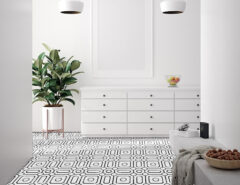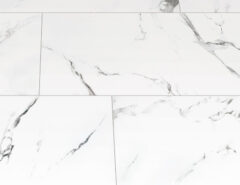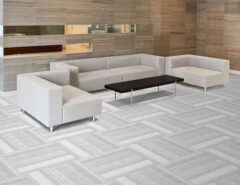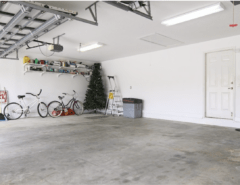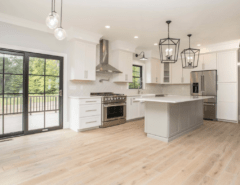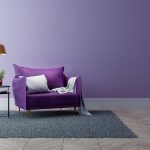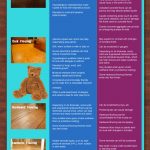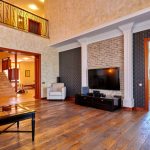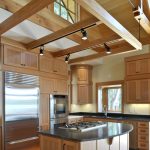Hardwood floors are tough to beat. They are beautiful, warm, add value to your home, and last for ages, but hardwood floors cannot withstand high levels of humidity and certainly cannot handle occasional flooding. So, installing hardwood flooring in your basement is not a good idea. Nonetheless, all is not lost!
Engineered hardwood with a stone plastic composite (SPC) core is the perfect water-resistant flooring for a potentially damp and troublesome space like your basement. Engineered hardwood is real wood flooring, providing the same warmth and timelessness; however, it is structurally capable of handling changes in relative humidity and temperature.
Below-Grade Flooring Requirements
A below-grade floor, which means “beneath ground level,” requires a higher level of moisture resistance in order to combat the mold, mildew, and water damage that can occur. Engineered hardwood that is designed for below-grade applications is highly water-resistant and can be installed using a variety of methods.
Engineered hardwood flooring can be installed over concrete with the use of an underlayment, which acts as a moisture barrier between the concrete and the flooring. Be sure to use the manufacturer-recommended underlayment. If needed, engineered hardwood can also be nailed or glued to a plywood subfloor with the appropriate underlayment sandwiched between.
6 Reasons Why Engineered Hardwood is Perfect for Basements
1. Water Resistance
Engineered hardwood flooring with a SPC core is made up of limestone and PVC which is pressure bonded, giving the flooring an increased level of stability and much higher resistance to water.
2. Warm, Real Wood Texture
A real hardwood veneer is affixed to the bonded layers. The same hardwood species used to make solid hardwood flooring are used to create the veneer for engineered hardwood, allowing for the preservation of the natural characteristics of the wood.
3. Compatible with Radiant Heating
Some engineered hardwood flooring is specifically designed to be used in conjunction with a radiant heating system. A subfloor must be installed to accommodate the heating system, but the addition of radiant heat reduces energy costs associated with heating the space and eliminates the need for forced-air heating.
4. Easy Installation
With a little DIY know-how and a handful of tools, you can put down your own engineered hardwood flooring. Engineered hardwood that is ideal for below-grade applications comes with a click-lock system, making it easy to install.
5. Long Lifespan
Engineered hardwood, if installed and maintained properly, can last decades. It’s lifespan is dependent on the thickness of the plank. Thinner planks tend to last upwards of 30 years, while thicker ones can last 80 years or more. These projections typically apply only to higher quality engineered hardwood flooring and less so to cheaper versions.
6. Increased Resale Value
It is no secret that solid hardwood is the king of the value-add when it comes to selling your home, and as such, engineered hardwood, a more structurally robust version of solid, can increase the resale value of your home.
Engineered Hardwood Compared to Other Basement Flooring
Let’s look at how engineered hardwood stacks up against the rest when it comes to basement installation.
Laminate
Generally speaking, laminate is not ideal for high moisture areas where water is attacking from below; however, there are some types of laminate that are constructed to be installed below-grade and directly on a concrete slab. The slab must be level and clean, and an underlayment must be installed between the flooring and the slab just like engineered hardwood. Unlike engineered hardwood’s warm and insulatory benefits, laminate does not harbor the same “real wood” feel when walking across it.
Vinyl
Sheet vinyl is certainly the most water resistant option available. It can be installed directly atop a concrete slab and has zero seams other than the edges at the space perimeter; however, it takes the exact shape of whatever it touches. If the slab is not level or has imperfections, those will show. Vinyl plank is your best choice in terms of a water-impervious vinyl option due to its high water resistance and easy click system. The wood-look designs mimic real wood, and the vinyl flooring offers a competitive level of comfort underfoot to that of engineered hardwood.
Epoxy
It would seem that a liquid coating option for your basement space would be an ideal solution. It is a sealer and flooring design rolled into one. However, epoxy typically lasts two to three years compared to engineered hardwoods’ 30 to 80 year range. The fumes are something to consider if you plan to use it in a basement, and it requires a long time to fully harden. If there are areas of repetitive high impact, epoxy will crack and chip. It is also very slippery when wet.
Ceramic Tile
Ceramic tile does not require the use of an underlayment or special subfloor. It can be applied directly over concrete. Like engineered hardwood and other flooring types, the slab must be level and clean. In terms of exposure to moisture, tile can endure flooding and will dry completely. Tile does not absorb sound and is not warm like engineered hardwood. It, too, can be installed over a radiant heating system.
Rubber
More so than engineered hardwood, rubber is highly sound and shock absorbent. It is one of the best flooring options for water resistance. Rubber tiles are certainly easy to install and can be replaced if damaged. Rubber sheet is extremely heavy and difficult to install for one DIYer. Rubber does not boast a wide range of visuals compared to engineered hardwood, but a few wood-look options exist, and they look as you might imagine—like rubber wood.
Hardwood
Real hardwood floors are certainly durable and have a longevity that is unparalleled, but when it comes to combating climate exposure such as moisture and heat, hardwood falls short. It is expensive and requires professional installation. Since engineered hardwood is cut from solid hardwood, it provides the same wide-ranging selection of species and colors but is considerably more tolerant to fluctuations in moisture and heat.
How to Shop for Engineered Hardwood Flooring
Basement flooring should be durable and highly resistant to moisture. There are many water-resistant and, in most cases, waterproof engineered hardwood options that meet both requirements. Be sure to look for engineered hardwood flooring that specifies it can be installed below-grade. If you would also like to install a radiant heating system, the flooring specifications will indicate whether or not it can be used in conjunction with radiant heat.
We can help you find the right engineered hardwood floor to fit your design tastes and that is ideal for your basement. BuildDirect’s flooring experts can help you navigate the complexities of product specs, installation uncertainties, and tool requirements.
Become a BuildDirect Pro Rewards member today for unlimited free flooring samples and long-term discounts.












